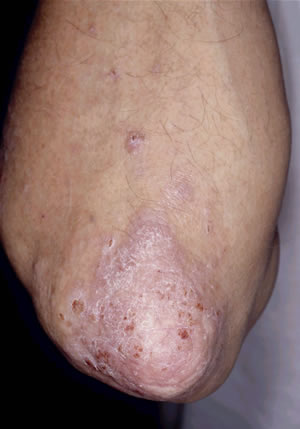When to Use a Coconut Oil Psoriasis Treatment
One shouldn’t be surprised at the proliferation of coconut oil psoriasis treatment stories flooding the web. After all, coconut oil is the latest cure-all, guaranteed to fix everything from bad teeth, to obesity, to brain fog, and skin health, including psoriasis. So let’s take look at what coconut oil is and what there is about it that makes it viable as a psoriasis treatment.
What is COCONUT Oil?
As you may have guessed from its name, coconut oil is the oil derived from the fruit of the coconut palm tree. It is that hairy-looking, hard-shelled fruit…nut… that when cut open delivers a watery whitish fluid known as coconut milk. It also has an inner core of white “meat” that when harvested can be shredded and used for all kinds of delicious treats. Coconut oil has become a popular and necessary ingredient in both the pharmaceutical and cosmetics industries.
However, you won’t find any oil
by cutting open a coconut. Instead the oil is produced when that “meat” is
squeezed, in a process known as cold-pressing. In some cases, the meat is first
dried, then fermented, heated, squeezed, etc. All of these different processes
claim to produce “virgin” and “extra virgin” coconut oil.

Coconut Oil Psoriasis of the SCALP
One of the most beneficial coconut oil psoriasis treatments is when it comes to treating scalp psoriasis. The lauric acid contained in coconut oil is known to reduce inflammation, fungal infections, viral infections and harmful microbes. It is also has a soothing, deep moisturizing effect on dry skin and scalp.
If you want to try treating your scalp psoriasis with coconut oil, you’ll probably get the best results by doing it right after you shower. Gently massage the oil into your scalp and then wrap your head with a warm towel. After about an hour gently wash out the oil and use a comb to remove any remaining scales.
Caution: Some people do have reactions to coconut oil, and you may actually see an increase in plaque due to the removing of old scales and new scales taking their place.
Coconut Oil Psoriasis Treatment
Coconut oil, extra virgin coconut oil, is also very moisturizing, and can be massaged into areas of dryness. The best time to apply this type of treatment is, again, after a shower. Some people report a definite easing of the dryness and itchiness associated with psoriasis by applying it directly to the affected areas two to three times per day.
Treating Psoriasis with Coconut Oil from the INSIDE OUT
Some people have found overall relief of their psoriasis symptoms by ingesting coconut oil on a daily basis. The recommended dosage is two tablespoons, which you can either just swallow as is, or mix in a smoothie, or even in your coffee or tea. And don’t forget, coconut oil is great for just about all your cooking and baking needs, which is just another way to ingest coconut oil.
Results can vary
While some people have reported noticeable psoriasis relief following the use of coconut oil, others have found that it does increase acne outbreaks. However, the reports of acne, whether bacterial or fungal, clearing up following daily application of coconut oil, really means that results will vary by individual. So don’t let the fear of acne or a negative skin reaction stop you from at least trying coconut oil for your psoriasis.
Caution on Using Coconut Oil
Be aware that the FDA considers coconut to be part of the tree nut allergy group, so if you have a nut allergy, you should be very cautious about using a coconut oil psoriasis treatment.
Back to top Psoriasis en la pierna
Psoriasis en la piernaPágina de inicio
Mapa del sitio
Mapa del sitio en orden alfabético